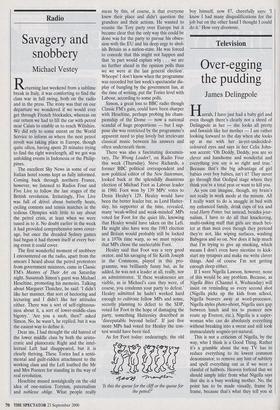Radio
Savagery and snobbery
Michael Vestey
Returning last weekend from a sublime break in Italy, it was comforting to find the class war in full swing, both on the radio and in the press. The irony was that on our departure we wondered if we would ever get through French blockades, whereas on our return we had to fill the car with petrol near Calais to enable us to reach Wiltshire. We did rely to some extent on the World Service to inform us where the next petrol revolt was taking place in Europe, though quite often, having spent 20 minutes trying to find the right wavelength, all we got was unfolding events in Indonesia or the Philip- pines.
The excellent Sky News in some of our Italian hotel rooms kept us fully informed. Coming back through northern France, however, we listened to Radios Four and Five Live to follow the last stages of the British revolution. Irritatingly, Five Live was full of drivel about butterfly heats, cycling contests and tennis matches in the tedious Olympics with little to say about the petrol crisis, at least when we were tuned in to it. No doubt earlier in the week it had provided comprehensive news cover- age, but once the dreaded Sydney games had begun it had thrown itself at every bor- ing event it could cover.
The first wonderful moment of snobbery I encountered on the radio, apart from the smears I heard about the petrol protestors from government ministers, came in Classic FM's Masters of Their Art on Saturday night. Susannah Simon's guest was Michael Heseltine, promoting his memoirs. Talking about Margaret Thatcher, he said: 'I didn't like her manner, that sort of hectoring and lecturing and I didn't like her attitudes either. There was a sort of self-righteous- ness about it, a sort of lower-middle-class bigotry.' Are you a snob, then?' asked Simon. No, he wasn't, he replied, but it was the easiest way to define it.
Dear me, I had thought the old hatred of the lower middle class by both the aristo- cratic and plutocratic Right and the intel- lectual Left had disappeared, but it is clearly thriving. These Tories had a senti- mental and guilt-ridden attachment to the working class and the Left loathed the Mr and Mrs Pooters for standing in the way of real revolution.
Heseltine mused nostalgically on the old idea of one-nation Toryism, paternalism and noblesse oblige. What people really mean by this, of course, is that everyone knew their place and didn't question the grandees and their actions. He wanted to reunite the Tory party over Europe but it became clear that the only way this could be done was for the party to pursue his obses- sion with the EU and his deep urge to abol- ish Britain as a nation-state. He was forced to concede that this might not happen and that 'in part would explain why . . . we are no further ahead in the opinion polls than we we were at the last general election'. Whoops! I don't know when the programme was recorded but last week's spectacular dis- play of bungling by the government has, at the time of writing, put the Tories level with Labour, according to some polls.
Simon, a great loss to BBC radio though Classic FM's gain, could have been sharper with Heseltine, perhaps probing his cham- pionship of the Dome — now a national scandal of huge proportions — but I sup- pose she was restricted by the programme's apparent need to play lovely but irrelevant classical music between his answers and often underneath them.
There was also a fascinating documen- tary, The Wrong Leader?, on Radio Four this week (Thursday). Steve Richards, a former BBC political correspondent and now political editor of the New Statesman, looked back at the splendidly disastrous election of Michael Foot as Labour leader in 1980. Foot won by 139 MPs' votes to Denis Healey's 129. Healey would have been the better leader but, as Lord Hatter- sley, his supporter at the time, revealed, many 'weak-willed and weak-minded' MPs voted for Foot for the quiet life, knowing that Healey would have taken on the Left. He might also have won the 1983 election and Britain would probably still be locked in a 1970s time warp, so we must rejoice that MPs chose the unelectable Foot.
Healey said that Foot was a very good orator, and his savaging of Sir Keith Joseph in the Commons, played in this pro- gramme, was brilliantly funny but, as he added, he was not a leader at all, really, nor an administrator. 'If these weaknesses are visible, as in Michael's case they were, of course, you condemn your party to defeat.' Healey admitted he hadn't worked hard enough to cultivate fellow MPs and some, secretly planning to defect to the SDP, voted for Foot in the hope of damaging the party, something Hattersley described as `disreputable beyond belief. If just five more MPs had voted for Healey the con- test would have been tied.
As for Foot today: endearingly, the old Is this the queue for the cliff or the queue for the petrol?' boy himself, now 87, cheerfully says: 'I knew I had many disqualifications for the job but on the other hand I thought I could do it.' How very divertente.






















































































 Previous page
Previous page